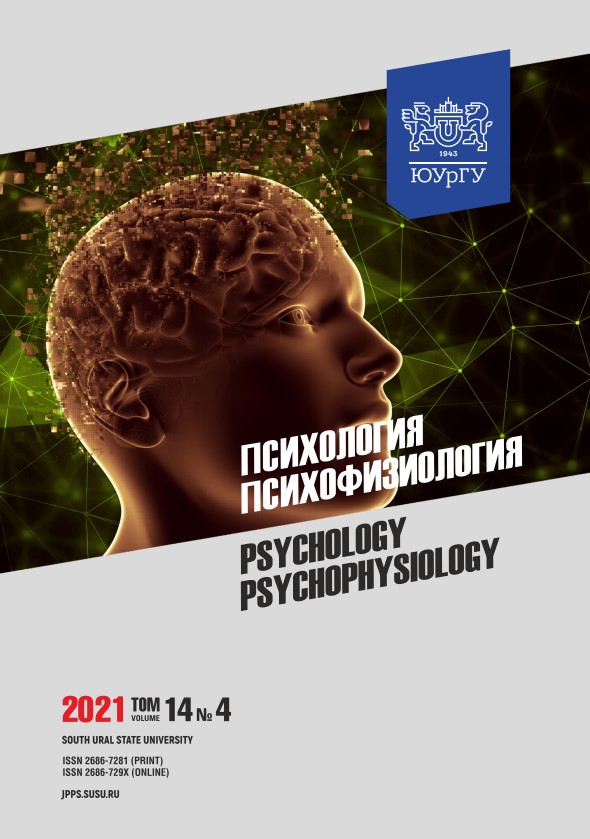MAGICAL THINKING AND BELIEF IN MAGIC IN THE STRUCTURE OF PSYCHOLOGICAL DEFENSES AND COPING STRATEGIES
Abstract
Abstract. Magical thinking is present in mental life along with logical thinking, without interfering with the normal existence of a person in society. Most often, magical thinking is actualized in emotionally significant situations, including stressful situations. Belief in magic, which denies the known laws of the real world, can also manifest itself in stressful situations. However, unlike magical thinking, it often leads to a decrease in personal adaptability. The fact that belief in magic is actualized in stressful situations as the need to adapt to them suggests that it functions either as a defense mechanism or as a coping strategy. Aim: the paper aims to analyze scientific grounds for classifying belief in magic as one of the above mentioned mental processes. Materials and methods: The CyberLeninka and eLIBRARY.RU electronic libraries were used to find scientific literature in the field. Results: аs a result of the study, it has been shown that belief in magic that is based on magical thinking is a coping strategy. Conclusion: the results of the study are the basis for further research on belief in magic and magical thinking as a coping strategy for various mental and psychosomatic disorders.
Downloads
References
2. Subbotskij E.V. [Survival in the machine world: a view of developmental psychologist on the causes of belief in magic in the age of science]. Nacionalnyj psihologicheskij zhurnal = National Psychological Journal. 2010;1(3):42–47.
3. Eckblad M., Chapman L.J. Magical ideation as an indicator of schizotypy. Journal of Consulting and Clinical Psychology. 1983;51, (2):218–225.
4. Serban G. The tyranny of magical thinking. N.-York: Dutton, 1982. 256 p.
5. Jalom I.D. Lechenie ot ljubvi i drugie psihoterapevticheskie novelly [Loves executioner and Other Tales of Psychotherapy]. Moscow, Nezavisimaja firma “Klass”. 1997:288. (in Russ).
6. Subbotskii E.V. [Magical thinking and belief in magic as a reserve of mental development and learning]. Obrazovanie i samorazvitie = Education and Self Development. 2013;(4): 211–216. (in Russ).
7. Subbotskii E.V. [The development of individual consciousness as a subject of research in experimental psychology]. Psihologicheskij zhurnal = Psychological journal. 2002;23(4): 90–102. (in Russ).
8. Subbotskii E.V. [Invisible reality: consciousness in the mirror of magical thinking]. Psiholog = Psychologist. 2015;(3):33–67. (in Russ). DOI: 10.7256/2409-8701.2015.3.14198
9. Lasarus R., Folkman S. Stress, appraisal and coping. NY: Springer. Pub. Co. 1984.
10. Subbotskii E.V. [The phenomenal and the pational in conscious: the struggle for dominance]. Psihologicheskij zhurnal = Psychological journal. 2001;22(5):94–97. (in Russ).
11. Frejd Z. Vvedenie v psihoanaliz [Introduction to psychoanalysis]. Moscow, Azbuka Publ. 2009:416. (in Russ).
12. Friedland N., Keinan G., Regev Y. Controlling the uncontrollable: Effects of stress on illusory control. Journal of Personality and Social Psychology. 1992;63:923–931.
13. Granovskaya P.M. Elementy prakticheskoi psikhologii [Elements of practical psychology]. Leningrad. Leningradskogo universiteta Publ. 1984:392. (in Russ).
14. Maklakova A.G. [The personal adaptive potential: its mobilization and prognostication in extreme conditions]. Psihologicheskij zhurnal = Psihologicheskii zhurnal. 2001;22(1):16–24. (in Russ).
15. Sergienko E.A., Vilenskaja G.A., Kovaleva Ju.V. Kontrol povedenija kak subjektnaja reguljacija [Behavior control as subjective regulation]. Moscow, Institut psihologii RAN Publ. 2010:352 p.
(in Russ).
16. Antsyferova L.I. [Personality in difficult living conditions]. Psikhologicheskii zhurnal = Psychological journal. 1994;15(1):3–19. (in Russ).
17. Folkman S., Schaefer C., Lazarus R. Cognitive Processes as Mediators of Stress and Coping. Human Stress and Cognition. V. Hamilton (Ed.) 1979;9:265–298.
18. Lasarus R. Emotions and interpersonal relationships: toward a person-centered conceptualization of emotions and coping. Journal of Personality. 2006;74(1):9–43.
19. Belinskaya E.P. [Coping as social-cultural problem]. Psikhologicheskie issledovaniya = Psychological Studies. 2009;1(3). URL: http://psystudy.ru/index.php/num/2009n1-3/54-belinskaya3.html (accessed 24.01.2021). (in Russ)
20. Mak-Vljams N. Psihoanaliticheskaja diagnostika: ponimanie struktury lichnosti v klinicheskom processe [Psychoanalytic diagnosis understanding personality structure in the clinical process]. Moscow, Nezavisimaja firma «Klass». 2015:592. (in Russ).
21. Rasskazova E.I., Gordeeva T.O. [Coping strategies in the psychology of stress: approaches, methods, perspectives]. Psihologicheskie issledovanija = Psikhologicheskie Issledovaniya. 2011;3(17). URL: http://psystudy.ru/index.php/num/2011n3-17/493-rasskazova-gordeeva17.html (accessed 24.01.2021). (in Russ).
22. Bairamova E.E., Enikolopov S.N. [Adaptation of the methods of determining the level of magical thinking M. Eckblad and L.J. Chapman on Russian sample]. Psikhiatriya = Psychiatry. 2016;1(69):40–46. (in Russ).
23. Zejgarnik B.V. [Mediation of self-regulation in normal and pathological conditions]. Vestnik Moskovskogo universiteta. Seriya. 14. Psikhologiya = Bulletin of the Moscow University. Series. 14. Psychology. 1981;2:9–15. (in Russ).
24. Myager V.K. Psihogigiena i psihoprofilaktika [Psychohygiene and psychoprophylaxis].
Leningrad, LNIPNI Publ. 1983:146. (in Russ).
25. Nalchadzhyan A.A. Socialno-psihicheskaja adaptacija lichnosti: (Formy, mehanizmy i strategii) [Socio-mental adaptation of personality: (Forms, mechanisms and strategies)]. Yerevan.
AN ArmSSR. 1988:262. (in Russ).
26. Sokolova E.T. Motivacija vosprijatija v norme i patologii [Motivation perception in normal and pathological conditions]. Moscow. Moskovskogo universiteta Publ. 1976:128. (in Russ).
27. Sokolova E.T. Samosoznanie i samoocenka pri anomalijah lichnosti [Self-awareness and self-esteem with the anomalies of personality]. Moscow. MGU Publ. 1989:215. (in Russ).
28. Bassin F.V. [About the power of “I” and psychological protection]. Voprosy filosofii = Philosophy questions. 1969;(2):118–125. (in Russ).
29. Volkova A.V., Mikhailova I.V. [Age peculiarities of men and womens stress coping] Vestnik Moskovskogo gosudarstvennogo oblastnogo universiteta. Seriya: Psikhologicheskie nauki = Bulletin of Moscow State Regional University. Psychology Series. 2018;(3):6–18. (in Russ). DOI: 10.18384/2310-7235-2018-3-6-18 (in Russ).
30. Weiten W., Lloyd M.A. Psychology applied to modern life. Wadsworth Cengage Learning, 2008.
31. Miceli M., Castelfranchi C. Further distinction between coping and defensive mechanisms. Journal of Personality. 2001;69(2):287–296.
32. Rasskazova E.I., Gordeeva T.O., Osin E.N. [Coping strategies in the structure of activity and self-regulation: psychometric properties and applications of COPE method]. Psihologija. Zhurnal Vysshej shkoly jekonomiki = Psychology. Journal of the Higher School of Economics. 2013;10(1):82–118. (in Russ).
33. Bairamova E.E., Enikolopov S.N. [Research of magical thinking in persons with endogenous mental illness]. Klinicheskaya i meditsinskaya psikhologiya: issledovaniya, obuchenie, praktika = Clinical and medical psychology: research, teaching, practice. 2016;4(14). URL: http://medpsy.ru/climp/2016_4_14/article03.php (accessed 24.01.2021). (in Russ).
References on translit
-Copyright (c) 2021 Psychology. Psychophysiology

This work is licensed under a Creative Commons Attribution-NonCommercial-NoDerivatives 4.0 International License.



